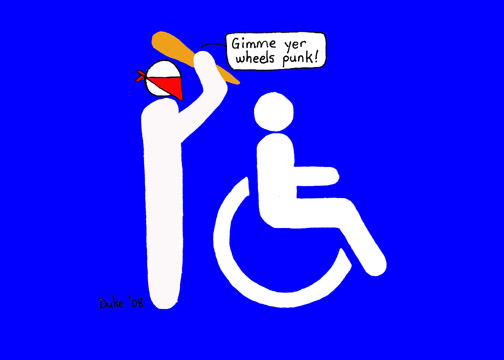Practically everything in the news these days is tied in some way to the state of our flailing economy. Unemployment is on the rise, people are losing their homes, companies are filing for bankruptcy protection, bankers and auto manufacturers are begging Congress for help and stock markets are freefalling without parachutes.
Charities and homeless shelters are in near panic mode as donations shrivel and lines grow at their doorsteps. College students face the more-for-less reality of higher tuitions and fewer classes, while trying to balance two and three part-time jobs to survive.
Crime rates tend to climb during bleak economic periods and many criminologists are predicting this holiday season will see a tremendous spike in criminal activity. Some law enforcement agencies describe the combination of our current economic situation and escalating unemployment rates as a perfect storm for shoplifters, burglars, robbers and violent criminals.
The most recent FBI crime statistics available are from 2007 and show, in fact, that most crime has either remained stable or climbed only slightly, except for violent and hate crimes.
In case you’re wondering where this editorial is headed, the focus is on hate crimes that aren’t treated as hate crimes, but should be.
Offenses that catch the limelight
While we will have to wait until next year to find out crime statistics for this year, one trend that seems to elude a lot of national public scrutiny involves wheelchair crimes.
Some reported wheelchair capers get media exposure because of their oddity. For example, a Florida man allegedly robbed a credit union and made his escape in his wheelchair. He was caught a few blocks away and police found the stolen money in his prosthetic leg.
Another man, this time in Memphis, Tenn., is accused of riding into a gas station mini-market in a wheelchair, grabbing beer and fleeing on foot. Both of the above crimes were covered by USA Today and The Associated Press, respectively, because of the oddity factor. These types of crimes only garner attention because of their unusualness and absurdity.
The crimes that get relegated to inside local newspaper pages or bottom-of-the-hour TV news coverage, however, are the type that should be splashed in headlines because they’re, quite frankly, atrocious; crimes against the disabled, notably wheelchair thefts.
Crimes that see little light
One story that got buried in mid-hour Los Angeles TV coverage last week involved two wheelchair thefts — both originating from car thefts. In one instance, the vehicle carrying a cerebral palsy patient’s custom made wheelchair was stolen. In the other, a paralyzed man’s car was stolen with his wheelchair, its accessories and spare wheels in it. Both vehicles were later recovered, but the wheelchairs and parts were not in them.
These types of heartless thefts are not anomalies, nor are they restricted to Los Angeles. In fact, a rash of wheelchair thefts has been cropping up from coast to coast during the past month.
Just three weeks ago, Annabelle Hulgan, a five-year-old Memphis girl’s wheelchair was stolen from her caregiver’s front yard. Hulgan has been “paralyzed from the waist down since birth by spina bifida” The Associated Press reported. Her $8,000 chair was recovered a few days later, but had been “chopped into a million pieces.”
Hundreds of other stolen wheelchair cases have been reported recently across the country, stretching from Seattle to New York.
Thieves who steal wheelchairs also steal another human’s mobility. Not only do they leave disabled people homebound — and in many cases bed-ridden — they place the victims in extreme peril.
A little girl with severe cerebral palsy had her chair stolen from her mom’s van in Atlanta. Dichelle Guffie‘s mother Rosalind said she can’t even take her daughter to doctor’s appointments without the custom chair.
“I can’t move her. She can’t go to the doctor. If anything happens to her I have to dial 911 because I can’t transport her,” Rosalind Guffie told an Atlanta TV station. Dichelle’s wheelchair was paid for by Medicaid, which only replaces chairs every three years. Dichelle has to wait two and a half years to get her wheelchair replaced.
Invisibility is national shame
Such crimes against disabled persons should be treated as hate crimes because they are civil rights violations. Unfortunately, our national politicians can’t get over the hump and pass legislation to categorize crimes against people with disabilities as hate crimes.
Former Pres. Bill Clinton tried to get significant legislation passed in 1998 with the Crime Victims with Disabilities Awareness Act. While the law was passed, it was narrow in scope by limiting implementation to people with developmental disabilities, not those with mobility issues.
The House of Representatives made another attempt in 2007 by passing H.R. 1592, the Local Law Enforcement Hate Crimes Prevention Act. That bid never cleared the Senate floor because of a threatened veto by Pres. Bush who thought the law was too “narrow.”
The only legal recourse local law enforcement agencies and prosecutors have is to consult federal sentencing guidelines, according to the National Council for Support of Disability Issues. Using those guidelines can be tricky because they require vague interpretations of what constitutes a hate crime.
This leaves prosecution of disabled persons’ adaptive equipment theft as hate crimes in the hands of individual states. California, for instance, is among the most stringent in the country for prosecuting hate crimes against disabled persons. Without federal legislation, though, establishing a hate crime is contingent on the prosecution being able to prove that the accused criminal targeted his or her victim explicitly because of their disability.
Need for ‘hate crime’ designation
The lack of federal legislation generally leads prosecutors to bypass charging wheelchair thieves with hate crimes. It seems that the nefarious nature of somebody stealing a wheelchair should be a “hate crime” no-brainer. Few people ride around in wheelchairs, especially custom-fitted chairs, for shear kicks.
In most cases specialized chairs are expensive and uninsurable. The victims are left to their own devices to find replacement chairs and some custom equipment is so expensive it can take families years to replace.
One of the things we need to address with the incoming administration is getting a federal designation of disability equipment theft as a hate crime. This would allow judges to enhance sentencing and put these vile crooks away for a few extra years. By limiting their mobility, perhaps these types of criminals would think twice before rolling off with a vulnerable person’s crucially needed property.




